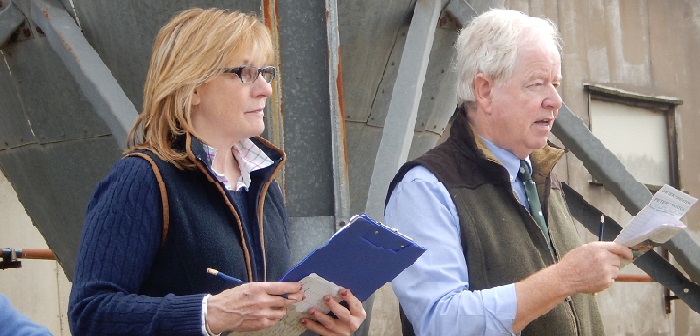Something of a ‘glass half empty’ day as far as pig trading is concerned. Although the latest SPP is marginally firmer, moving up by 0.11p to 145.27p, European mainland pig meat prices still have a lot of catching up to do.
The influential German producer price stood on at 1.42 EUR. This only translates to 124p in our money.
A slightly more complex picture is painted by the fall in EU wide pig prices over the past 12 months, where the average mainland producer price has fallen from 143p/kg to a mere 119p which is a fall in value terms of almost £20 per pig.
Weekly contribution prices have remained at generally similar levels, with one contract-buyer adding 1p mainly but most within the 142p-144p range according to spec.
There was a little more demand for spot bacon in places with a few abattoirs looking for extra numbers, as well as reports that one of the major contract abattoirs also needed more pigs than were available. But this has yet to be translated into any significant improvement on the price front, with spot bacon generally in the 142p-145p range, although regular sellers could look to achieve premiums of 2p-4p above this.
On the currency front, despite the Euro gaining in value and trading on Friday worth 87.73p compared with 87.55p a week earlier, this did nothing to help cull sow values which actually slipped by a further 1p/kg in most cases, meaning that cull sows were traded within the 64p-67p range according to load size and spec.
Reports of EU cold stores filling up with manufacturing grade pig meat make slightly uneasy reading, especially bearing in mind that there are three ‘short holiday’ weeks in Germany on the horizon.
Weaner prices saw the latest AHDB 7kg average slip by 0.21p to £36.98/head. Unfortunately no quote was available for 30kg due to insufficient price availability, but 30kg contract sales of Red Tractor pigs have tended to be in the £46-£50/head range, with Freedom Foods worth another £2-£4 more than this.
Spot loads of 7kg and 30kg Red Tractor weaners are still proving hard to clear mainly due to buyers’ concerns over higher feed prices, dearer straw and no clear message being received that there are likely to be significant improvements in finished pig values, despite the shortage of numbers in the system following climate related problems during the winter.
Feed prices have remained relatively firm, with 48% Brazilian soya meal ex Liverpool traded at £361/t and 34% rape meal ex Kent at £222/t.
UK ex farm feed wheat spot values are holding firm at £147.50/t although forward prices are looking comparatively good value for buyers when compared with spot, and London wheat was traded at £144.65 for July and £147.40 for November.
The global grain supply and demand situation remains mixed following reports of poor weather in South America where demand has overtaken supply for the first time since 2012/13. However, at the same time global grain stocks are predicted to finish the year at their third highest level on record underlining the previous four years of surplus supplies.
Oil prices are however rising, and this often provides a link to the direction cereal markets are likely to take so those UK producers who have decided to take a little more cover on a forward basis for their future feed needs may be on the right track.
And finally, underlining the fact that markets do not flourish during periods of uncertainty, these latest global reports are indicating that due to disease risk, trade disputes, feed availability and the Brexit situation this may distort markets and add downward pressure following the China/US trade dispute, although there could be some benefits to southern hemisphere pig production countries.
The other big concern are the threats posed by African swine fever which continues to spread in Europe and will be an absolute killer in every sense of the word if it somehow managed to penetrate Western Europe and even worse, the UK.




